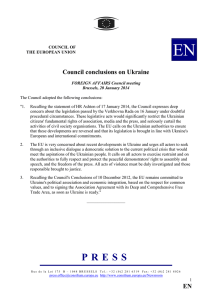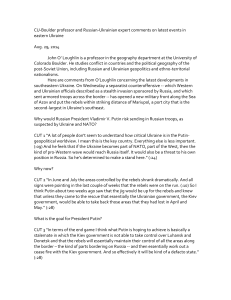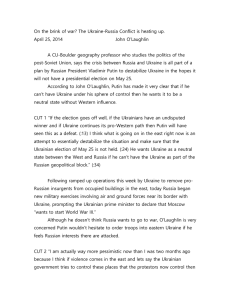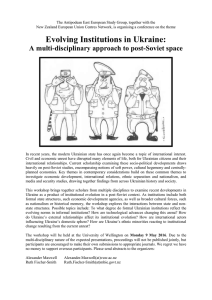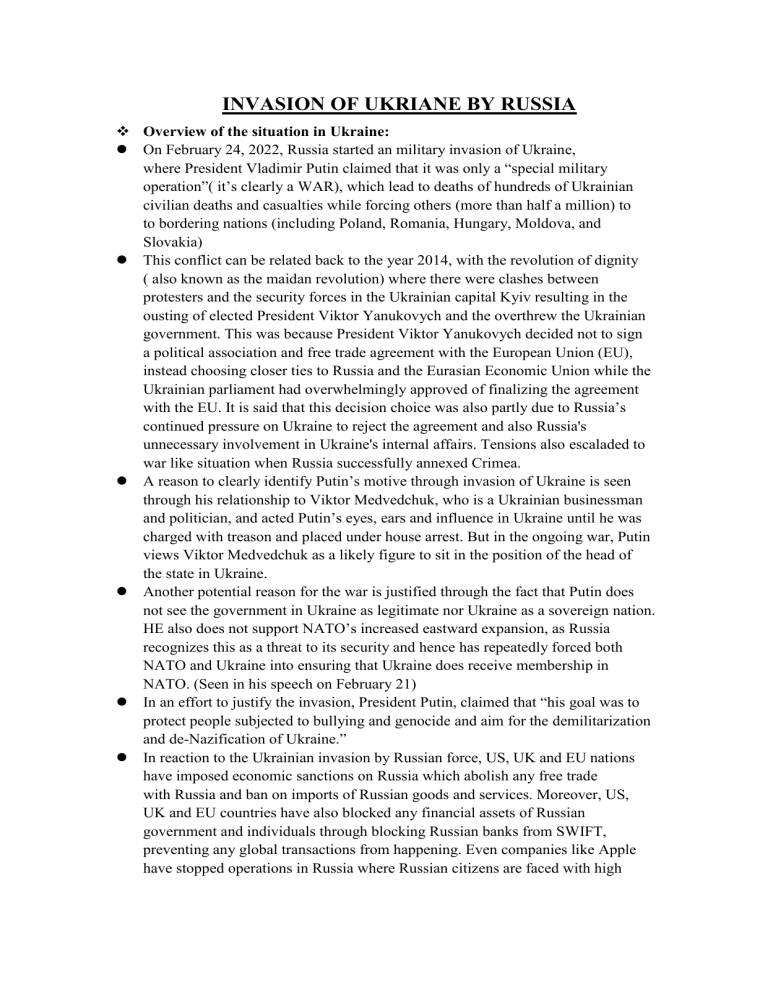
INVASION OF UKRIANE BY RUSSIA Overview of the situation in Ukraine: On February 24, 2022, Russia started an military invasion of Ukraine, where President Vladimir Putin claimed that it was only a “special military operation”( it’s clearly a WAR), which lead to deaths of hundreds of Ukrainian civilian deaths and casualties while forcing others (more than half a million) to to bordering nations (including Poland, Romania, Hungary, Moldova, and Slovakia) This conflict can be related back to the year 2014, with the revolution of dignity ( also known as the maidan revolution) where there were clashes between protesters and the security forces in the Ukrainian capital Kyiv resulting in the ousting of elected President Viktor Yanukovych and the overthrew the Ukrainian government. This was because President Viktor Yanukovych decided not to sign a political association and free trade agreement with the European Union (EU), instead choosing closer ties to Russia and the Eurasian Economic Union while the Ukrainian parliament had overwhelmingly approved of finalizing the agreement with the EU. It is said that this decision choice was also partly due to Russia’s continued pressure on Ukraine to reject the agreement and also Russia's unnecessary involvement in Ukraine's internal affairs. Tensions also escaladed to war like situation when Russia successfully annexed Crimea. A reason to clearly identify Putin’s motive through invasion of Ukraine is seen through his relationship to Viktor Medvedchuk, who is a Ukrainian businessman and politician, and acted Putin’s eyes, ears and influence in Ukraine until he was charged with treason and placed under house arrest. But in the ongoing war, Putin views Viktor Medvedchuk as a likely figure to sit in the position of the head of the state in Ukraine. Another potential reason for the war is justified through the fact that Putin does not see the government in Ukraine as legitimate nor Ukraine as a sovereign nation. HE also does not support NATO’s increased eastward expansion, as Russia recognizes this as a threat to its security and hence has repeatedly forced both NATO and Ukraine into ensuring that Ukraine does receive membership in NATO. (Seen in his speech on February 21) In an effort to justify the invasion, President Putin, claimed that “his goal was to protect people subjected to bullying and genocide and aim for the demilitarization and de-Nazification of Ukraine.” In reaction to the Ukrainian invasion by Russian force, US, UK and EU nations have imposed economic sanctions on Russia which abolish any free trade with Russia and ban on imports of Russian goods and services. Moreover, US, UK and EU countries have also blocked any financial assets of Russian government and individuals through blocking Russian banks from SWIFT, preventing any global transactions from happening. Even companies like Apple have stopped operations in Russia where Russian citizens are faced with high rates of inflation and interest rates (reaching nearly 20%) and also depreciation of the Russian rubble. Putin justified his invasion by claiming that Ukraine was not a “real” state. On Feb. 21, the day Putin recognized two separatist regions in eastern Ukraine as independent entities and then ordered Russian troops there to “maintain peace,” he accused Ukrainian leaders of having “replaced the real cultural, economic and social interests of the people and Ukraine’s true sovereignty” with a corrupt and “corroded Ukrainian statehood.” TIMELINE OF CONFLICTS BETWEEN RUSSIA AND UKRAINE A major concept that relates to this issue is the concept of sovereignty, specifically external sovereignty. External sovereignty: It refers to the ability of states to act independently in the face of external forces, moreover it also identifies a countries right to be free from any external inferences into it domestic issues, that challenge the rights and freedom of a nation to have absolute control over its own territory. In this case we have to consider that President Vladimir Putin never recognized Ukraine as a independent sovereign nation. Russian troops invasion into Ukraine poses a threat to and is a blatant violation of their territorial sovereignty. It also contrasts with Putin’s claims of noninterference in countries’ internal affairs. While Putin justifies his invasion through his claims about performing “peacekeeping duties” while Ukraine and western nations will view this as an attempt of occupation of the region. Sovereignty There has been a violation of human rights from both the Russian and Ukrainian sides. Ukrainian side: Human Rights The right to freedom of choice and conscience has been violated with the imposition of the martial law , which bans men aged 18 to 60 from leaving the country and makes it compulsory for them to be a part of the war in defending the Ukrainian front from Russian troops. It is also true that Ukrainian government has also failed to protect the security of citizens. Russian side: Russia is condemned of war crimes and violating international laws and treaties. Russia violated the Geneva Conventions, which states that all parties involved in armed conflict have obligations to distinguish between civilians and combatants in order to protect civilians and noncombatants from hazards of war. Russia also violated the Minsk agreement(attempt to secure a ceasefire between the Ukrainian government and Russia-backed separatists in the east of Ukraine) and the UN charter(UN Charter prohibits the use of military force against another state). The freedom of assembly, freedom from arbitrary arrest and freedom of expression. In relation to these laws Russia is also accused of using harsh measures (including arbitrary arrest) and heavy-handed police tactics to suppress peaceful protests. Russia also violates Ukrainian citizens right to adequate standard of living and the right to education. These rights are being violated through repeated shelling in areas, missile attacks, orphanages and schools being targeted in attacks in contested regions of Ukraine. The conflict mainly involved use of hard power by a country in order to achieve its goals Use of hard power- a coercive approach that involves the use of military power or economic incentives to influence another actors behaviors. Russian side(Regional level of analysis)- Russia has been accused for the use of hard power, through the use of military force against Ukraine. Fears increased after the shelling of a Ukrainian kindergarten and when separatist leaders urged the evacuation of civilians from breakaway regions of eastern Ukraine. The fears are also growing as President Putin put nuclear weapons on high alert near the Ukrainian borders. Power Nations worldwide(US, UK, EU, Japan, Australia etc., Looking thorough the international level of analysis)- Nations worldwide have imposed economic sanctions on Russia which bans trade with Russian companies and any foreign company. Due to economic sanctions Russia’s economy is struggling, with the Russian ruble is depreciating in value(The ruble fell about 30% against the dollar). With the economic sanctions the central bank of Russia raised the interest rates from 9.5% to 20%, to protect the economy from the effects of the sanctions. The invasion of Ukraine interestingly covers two types of violence's caused by Russian Violence and Conflict troops- There is both the existence of direct violence Conflict Conflict through military face-offs in the regions of Donetsk and Brovary, where there have been reports of bombings of hospitals, nurseries, orphanages and schools. These repeated targeting of these essential facilities by the Russian troops also signifies the level of structural violence in Ukraine, where Russia is deliberately targeting Ukrainian citizens and destroying essential and basic needs where there have been reports of shortages of food, essential medical equipment and medicines. We can also see a domino effect of the increasing violence in Ukraine on global food supply, as Ukraine is a major supplier of wheat and the ongoing violence in the country is causing global wheat prices to rise substantially, eventually causing some people being unable to afford the high prices of items produced with wheat. We can also identify two major types of conflicts that come into play which are- territorial and interest- based conflicts. Territorial conflict as we know that President Putin never recognized Ukraine as a sovereign nation and his ultimate plan would be to have full legitimate control over Ukraine, this invasion can also be seen through the lens of interestbased conflict as Ukraine is home to abundant reserves of value-able minerals including coal, iron ore,salt, manganese, sulfur, titanium, mercury and huge blocks of oil and gas. These resources may help justify the reason for invasion of Ukraine by Russian troops, as these resources are highly value-able and high in demand in the global economy. The concept of interdependence can bee seen for both the political actors Ukrainian side- With countries in EU Interdependence and UK, US and Australia imposing sanctions on Russian goods and services after invasion by Russian troops. Interdependence is also seen through the increased support by other nations where Germany has sent their top technologically advanced military weapons, followed by US and UK. Whereas Poland has supported Ukraine by opening borders to refugees and providing health care facilities to the wounded. We also got to consider that Ukraine is one of the top producers and exporters of wheat and with the ongoing war is having an impact not only on the regional but also the international level, with rise in cost of wheat(due to shortages). Russian side- With Belarus supporting Russia in conquering Ukraine by allowing Russian troops to pass through their country to the borders between Belarus and Ukraine giving Russia a strategic advantage as they are able to invade from 3 different fronts(Russian, Belarus, Crimea). Russia’s relation with China is also considered as interdependence as China is still heavily reliant of oil and gas, while China abstained from voting in the UN, China signed a oil and gas deal of around $200 billion with Russia. It would be interesting to see how EU nations are able to decrease their dependence on Russian oil and gas. Development refers to sustained increased in the standards of living in a country. In the situation the levels of development in both the countries have decreased dramatically(in measuring development it is better to use composite indicators like HDI rather than singular indicators like GDP as composite indicators take into account a variety of measures ranging from literacy rates, to health care, etc.) Development in Russia(National level of analysis)- Overall the Russian economy is suffering drastically due to the harsh sanctions imposed by most of the nations worldwide. This leads to a lower level of standards of living seen through lower levels of Human Development Index(HDI), increasing inequality in the country( using Gini coefficient value), decreasing levels of education and higher levels of unemployment as foreign firms shut down production in the country. Development in Ukraine(National level of analysis)- Similar to Russia, the levels of development and standard of living have severely depleted in Ukraine. Mainly seen through infrastructural damage, lower levels of Human Development index(HDI), higher illiteracy rates(due to bombings of schools and orphanages). We must not look at the increase in GDP as an indicator, rather we should look where the money is being spent which is clearly being spent on increasing military forces and purchase of military weapons. This is driving away essential money needed to rebuild sectors like health, education,etc. Which may also inhibit long term human development. Development Development worldwide(International level of analysis)- The overall development world wide decreases as the prices of goods and services in the economy increases. European countries are able to experience a larger effect as some of the countries are heavily reliant on Russian oil and gas to provide for heating in their homes.The overall world economy suffers from higher inflation rates and also spending being diverted from sectors promoting grater human development to sectors such as defense due to rising risk of Russia using of nuclear weapons and similar invasions into other bordering nations. We can also consider the roles of MNC’s in the international level of analysis where companies like Apple, McDonald, H&M, Google, Meta, etc, have stopped their operations and production facilities in Russia amid the invasion. We could also look at Elon Musk’s, Star-link which is providing satelli8te TV to the Ukrainian citizens. Bibliographyhttps://www.dw.com/en/russias-invasion-of-ukraine-in-7-graphics/a-60909241 https://news.gallup.com/opinion/gallup/390395/ukraine-war-threatens-world-food-sup ply.aspx https://www.cnbc.com/2022/02/28/economic-sanctions-send-russians-scrambling-fordollars-euros-and-other-currencies-as-ruble-plunges.html https://news.stanford.edu/press-releases/2022/01/06/understanding-rua-ukraine-crisis/ https://www.amnesty.org/en/latest/news/2022/03/russia-ukraine-invasion-of-ukraine-i s-an-act-of-aggression-and-human-rights-catastrophe/ https://www.savethechildren.net/news/ukraine-attacks-schools-endangering-children-s -lives-and-futures Conflict between Turkey and Kurdish groups Overview of the situation(Context+ Current situation): The Kurdish–Turkish conflict is an armed conflict between Turkey and various Kurdish insurgent groups whose motives are to either have a separation from Turkey and establish an independent Kurdistan or secure autonomy and greater political and cultural rights for Kurds inside the Republic of Turkey Kurds comprise nearly one-fifth of Turkey’s population of seventy-nine million. The PKK, established by Abdullah Ocalan in 1978, has waged an insurgency since 1984 against Turkish authorities for greater cultural and political rights, primarily with the objective of establishing an independent Kurdish state. The ongoing conflict has resulted in nearly forty thousand deaths. Turkey wants to push back Syrian Kurdish militia called the People's Protection Units (YPG)from its border as Turkish leaders view them as a terrorist organization. The PKK's presence in Iraqi Kurdistan has resulted in the Turkish Armed Forces carrying out frequent ground incursions and air and artillery strikes in the region, and also a similar situation in the Syrian Kurdistan side.The conflict has cost the economy of Turkey an estimated $300 to 450 billion, in military costs. The PKK was founded in 1978 by a group of Kurdish students led by Abdullah Öcalan. The initial reason given by the PKK for this was the oppression of Kurds in Turkey and the PKK was formed in order to establish linguistic, cultural, and political rights for Turkey's Kurdish minority. At the time, the use of Kurdish language, dress, folklore, and names were banned in Kurdish-inhabited areas. Under the Erdogan(Turkish president) regime, popular discontent has steadily increased: the PKK, the Peoples’ Democratic Party (HDP) (a left-wing pro-Kurdish party), and the People’s Protection Unit (YPG) (the armed wing of the Syrian Democratic Union Party (PYD) with ties to the PKK) have increasingly agitated against the government, conducting numerous attacks against Turkish authorities in the southeast Following attempted coup in July 2016, Erdogan cracked down on suspected coup conspirators, arrested an estimated fifty thousand people, and increased air strikes on PKK militants in southeastern Turkey. In March 2018, Turkey launched military operations to eliminate the Kurdish PKK fighters in northern Iraq. This failed however, as the PKK has expanded its operations in Iran. On 14 February 2021, Turkish Minister of Defense Hulusi Akar claimed that 13 soldiers and police officers, who had been held hostage by the PKK since 2015 and 2016, were executed during an attempted rescue operation. The YPG dominates an alliance of Kurdish and Arab militias called the Syrian Democratic Forces (SDF), which drove IS out of a quarter of Syria with the help of a US-led multinational coalition. When the US declared the defeat of IS in March, Turkish President Recep Tayyip Erdogan pushed it to create a "safe zone" clear of YPG fighters in north-eastern Syria where refugees could be resettled. The US agreed to establish one together with Turkey in August and the YPG complied. Turkey’s defense secretary said the attacks were launched against positions occupied by the PKK, the People’s Protection Units (YPG) who it views as a PKK affiliate, and other “outlawed groups” in the northern Syrian area of Derik and the northern Iraqi regions of Sinjar and Karacak. Violence and Conflict Conflict Conflict The main concept that applies to the global issue is conflict, covering 3 types of conflicts covered in the course Territorial conflict- It is clear that Turkey does not consider Kurds and their traditions/ culture as a part of their country(even though they make up one fifth of the population), they rather consider them as terrorists. Hence Turkish government has launched air raids and military operations against them(the kurds) due to the Kurds repeated attempts to overthrow the government in Turkey, causing the issue to escalate to a pint where the Kurds presence in the area is a threat to Turkey’s national security. Territorial conflict also increased when Turkish government decided to launch an operation to create a 440km-long "safe zone" unilaterally and following the decision US troops also withdrew from the region. Ideological and Identity conflict- Since World War I, Kurds in Turkey have been the victims of persistent assaults on their ethnic, cultural, religious identity and economic and political status by successive Turkish governments. Hence the PKK was established, in order to fight for the rights of the Kurdish population and if possible create an independent state for themselves which eliminate any discrimination against the Kurdish population. But Turkey did not like the idea of creation of an independent state, Kurdistan, as they had the historical ideologies of kurds being armed militia groups going against the government and having their own state would cause a grater threat to turkeys security. These conflict eventually led to direct violence in contested regions between Turkey and the Kurds. On a regional lens this violence had a negative impact on both the political actors as significant resources were spent on the conflict and there was a great loss of civilian lives in the conflict. There is also involvement of international political actors like the US, which has a history of supporting the PKK in eliminating the Islamic State groups in the regions and then eventually switching sides to support Turkey once all major Islamic State groups were eliminated from the region. Turkey is also accused of using chemical weapons against the Kurdish population. Human Rights There have been incidents of human rights violations by both the political actors involved in the conflict Human rights violations by Turkey- Starting from an international level of analysis, both European Convention on Human Rights and the UN have condemned Turkey of violating Kurds human rights and have called the country out for reports of alarming human rights violations against the Kurdish population in the county, and Turkey has also been accused of using law to detain human rights defenders. Turkey violated the right to freedom of belief and expression of the Kurdish population as Kurdish language and traditions have been repeatedly suppressed by the government. This also connects to the violation of the right to education as schools that had Kurdish language as the medium of instructions were shut down and people caught teaching or conversing in Kurdish were arrested. Freedom of expression is also violated due to to governments increased controlled over media and journalists going against state propaganda are arrested ad criminally prosecuted.There have also been incidents of arbitrary arrest carried out by law personnel's where more than 90,000 citizens were arrested and more than 1,500 nongovernmental organizations were closed on terrorism-related grounds. There have been reports of continued detention, including opposition politicians and former members of parliament, lawyers, journalists, human rights activists, and employees of the U.S. Mission, for purported ties to “terrorist” groups or peaceful legitimate speech. Freedom of life, liberty and security are also being violated through the government contributing to civilian deaths in connection with its fight against the terrorist Kurdistan Workers’ Party (PKK). Turkish-supported Syrian opposition groups committed human rights abuses, reportedly targeting Kurdish and Yezidi residents and other civilians, including arbitrary arrests and enforced disappearance of civilians; torture and sexual violence; forced evacuations from homes; looting and property seizures in areas under Turkish control; transfer of detained civilians across the border into Turkey; restricting water supplies to civilian populations; recruitment of child soldiers; and looting and desecrating religious shrines. Even though Turkey has repeatedly denied/ rejected any human rights violations in Syria, it is evident that the country is actively in violation of the UNDHR. Human rights violations by the Kurdish group(PKK/YPG)- The PKK also doesn’t have a clear record when referring to human rights as the group has been accused of murdering 13 innocent lives in northern Iraq. around 2 million civilians were forced to migrate from the region east of the Euphrates River because of YPG/PKK arbitrary practices these forced displacements are violations of only only the fundamentals of human rights but also violation of right to life or the right not to be subjected to inhuman or degrading treatment. The groups, specifically PKK, have been recruiting under age children in their military and have been training them, snatching their right to education and freedom to make their own choices. Interdependence Interdependence is interesting while looking at it from the international level of analysis as there has been a history of relationship between the Kurdish groups and the US.The PKK/ YPG have been a strategic US ally in countering and fighting Saddam Hussein's regime. In the process the US provided the Kurdish with weapons in order to decrease the Islamic States groups regime, which was heavily anti- west, particularly anti- US propaganda. But when the Islamic State group and the leader, Saddam Hussein, US support for the Kurdish fell quickly. Interdependence is not limited to the role of the US but at the regional level of analysis we are bale to see that Turkey, Syria, Russia and Iraq have collectively fought against the Kurds, in order to have full legitimate control and sovereignty of their country. These nations have collectively carried out air raids and military operations against the Kurdish populations and the PKK/ YPG, and are also a part of the human rights violations that takes place against the Kurds in the regions of the middle east. Bibliography https://www.state.gov/reports/2020-country-reports-on-human-rights-practic es/turkey/ https://ec.europa.eu/research-and-innovation/en/projects/success-stories/all/e chr-and-human-rights-violations-against-kurds-turkey#:~:text=In%20earlie r%20times%2C%20the%20ECHR,and%20politicians%2C%20and%20arb itrary%20arrests. https://www.aljazeera.com/news/2019/10/10/fighting-rages-as-turkey-steps-u p-assault-against-kurdish-forces https://www.hrw.org/world-report/2021/country-chapters/turkey https://www.crisisgroup.org/middle-east-north-africa/eastern-mediterranean /syria/us-joins-turkey-pkk-fight-northern-syria https://en.wikipedia.org/wiki/Kurdish%E2%80%93Turkish_conflict_(1978 %E2%80%93present)#2015%E2%80%93present https://www.cfr.org/report/future-u.s.-turkey
